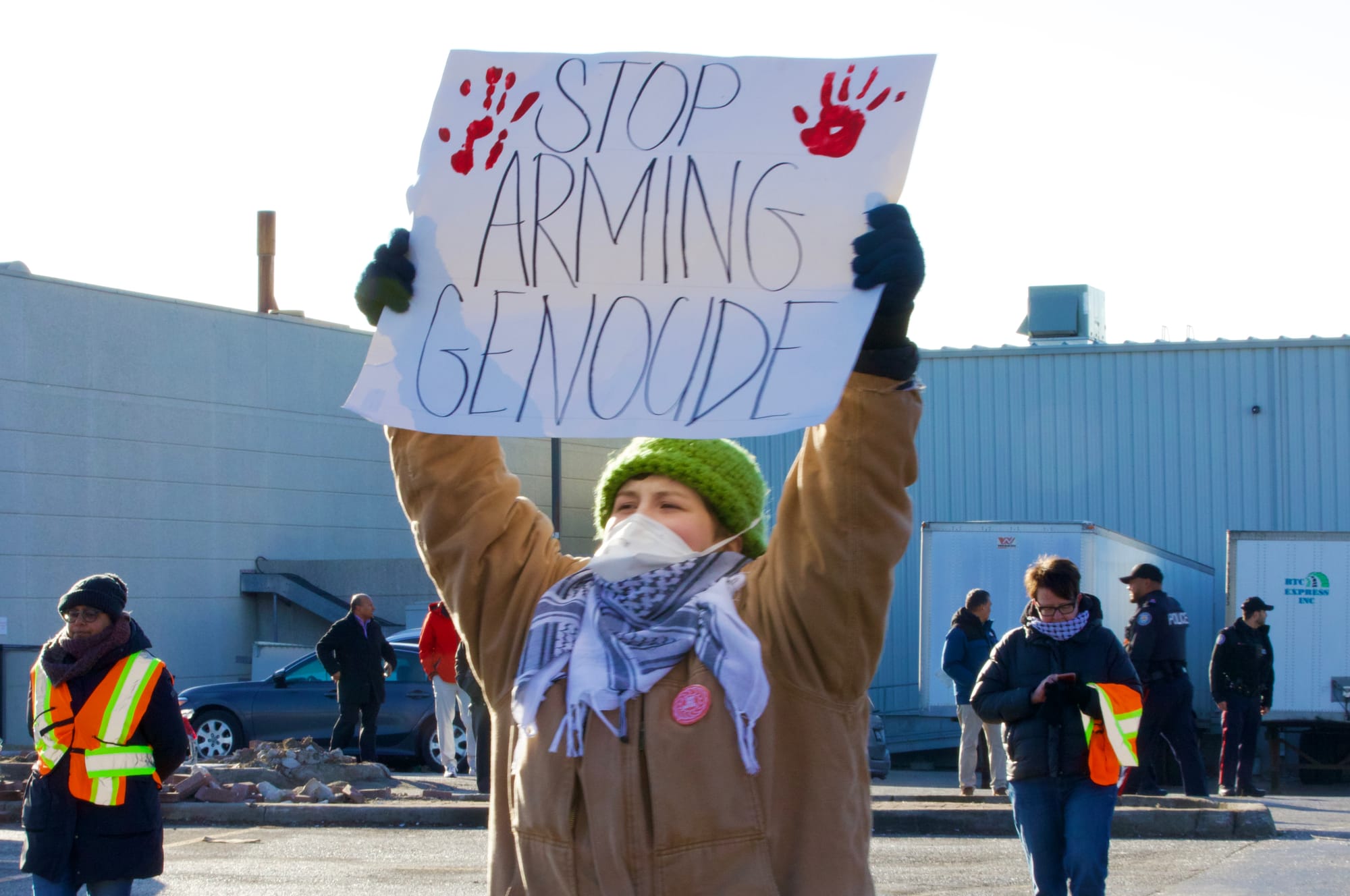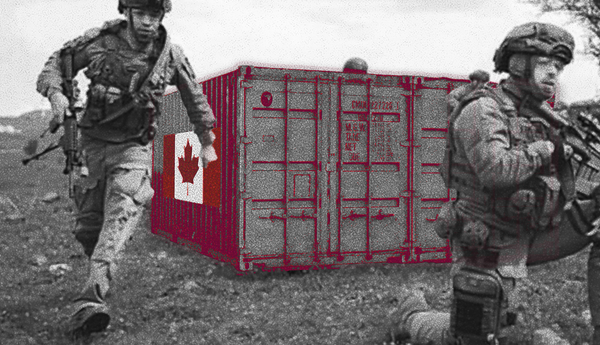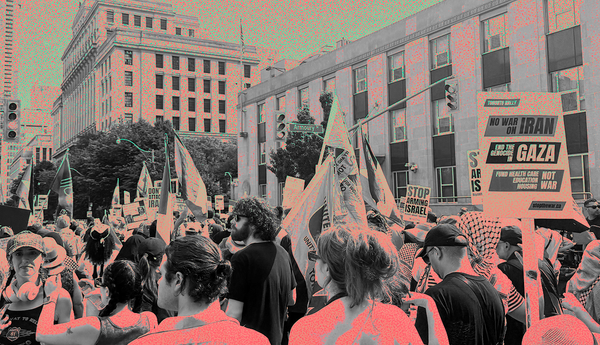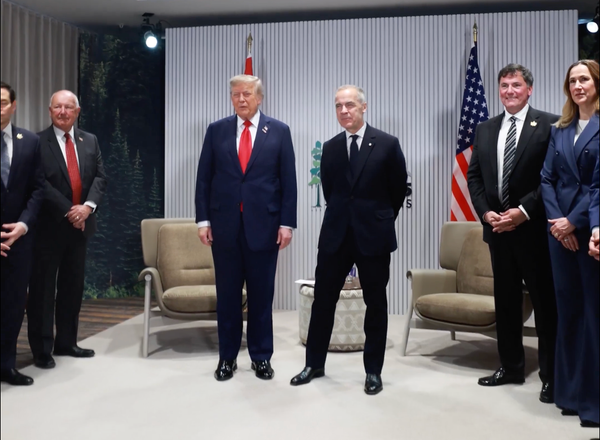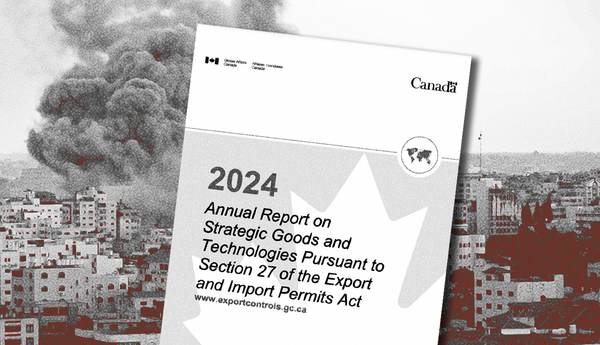A coalition of Canadian advocacy groups and labour unions has launched a new campaign renewing demands for a “full, immediate arms embargo on Israel,” including on Canadian military goods and technology that are shipped to Israel via the United States.
Rachel Small, an organizer with World Beyond War Canada, told The Maple that a “unified collective demand” was needed to demonstrate that the federal government’s promise to pause approvals of new permits for military exports to Israel is “far from sufficient.”
“It has become clear that it will take a strong, unified, multi-sector demand of people all across the country to push this forward right now,” said Small.
MPs voted in favour of a non-binding motion in Parliament in March that called on the Trudeau government to “cease the further authorization and transfer of arms exports to Israel.”
However, Foreign Affairs Minister Melanie Joly clarified that she would only commit to delaying approvals of new permits, and that those approved before January 8 would still be allowed to go ahead as normal. The government has not issued a formal notice about the promised pause on new permit authorizations.
The newly launched “Arms Embargo Now” statement notes that Canada’s own laws require that the government stop military exports if there is a substantial risk that such goods could be used to “facilitate serious violations of international humanitarian or human rights law, or commit serious acts of violence against women and children.”

It further notes that under the 1948 Genocide Convention, of which Canada is a signatory, the federal government must “prevent and punish” the crime of genocide. Israel is currently on trial for committing genocide against Palestinians in Gaza at the International Court of Justice (ICJ), which ruled in January that South Africa’s case against Israel was “plausible.”
Israel’s war on Gaza has killed more than 35,091 people since last October, damaged or destroyed more than 60 per cent of the enclave’s residential properties, and plunged it into a humanitarian catastrophe.
Back in February, UN experts warned that all states must stop arms exports to Israel, “including export licenses and military aid,” since any such transfers are “likely to violate international humanitarian law.” The UN statement specifically named Canada as one of several countries that continue to export military goods to Israel.
“State officials involved in arms exports may be individually criminally liable for aiding and abetting any war crimes, crimes against humanity or acts of genocide,” the UN experts said.
Some of the initial signatories of the Arms Embargo Now coalition include the Arab Canadian Lawyers Association, the Canadian Association of Professional Employees (CAPE), Canadians for Justice and Peace in the Middle East (CJPME), the Canadian Union of Postal Workers (CUPW), the Canadian Union of Public Employees (CUPE), Centre international de solidarité ouvrière (CISO), the Public Service Alliance of Canada (PSAC), Independent Jewish Voices, Labour Against the Arms Trade (LAAT), the National Union of Public and General Employees (NUPGE), and the Palestinian Youth Movement.
A full arms embargo would halt the export of all Canadian military goods and technology to Israel — including by revoking existing export permits — and also end all Canadian purchases of Israeli military goods, including the Department of National Defence’s plan to buy $43 million of Spike missiles, as announced last December.

Such an embargo would also prevent any Canadian military goods from reaching Israel via the United States. This includes Canadian-made components that are fitted into U.S.-made F-35 fighter jets, which the Israeli military has used to bomb Gaza.
The federal government does not proactively disclose the value of military exports that go to Israel via the United States. In February, The Maple revealed that the Trudeau government authorized $28.5 million worth of new, direct military exports to Israel during the first two months of Israel’s war on Gaza.
The Trudeau government has repeatedly claimed that all military exports to Israel since October have been “non-lethal,” a legally meaningless term that does not exclude component parts of deadly weapon systems.
The Maple is currently waiting for further data about Canadian military exports to Israel that may have been authorized from December 2023 onwards.
Campaign Hopes To Build Momentum
A Canadian arms embargo on Israel would not be unprecedented. The coalition notes that Canada imposed such an embargo on Israel during the first intifada, which broke out in 1987.
According to Small, the first signatory organizations in the Arms Embargo Now coalition represent at least two million people across Canada. The coalition’s immediate goal is to encourage an even broader swath of groups to sign onto the statement.
Meanwhile, the coalition is calling on individuals to write to their members of Parliament to encourage them to sign on as well.
“MPs are being approached right now by their constituents, and several have already signed on to the letter, which is exciting,” said Small. “We’ll be going public with a number of initial MP signatories in the coming weeks, once we’ve given a proper chance for many of them to choose to read it fully and endorse it.”
Small noted that one of the signatory labour unions, CAPE, represents employees at Global Affairs Canada (GAC), the ministry in charge of the permitting process for military exports.
“That’s a really notable show of solidarity, that they’re unwilling to be potentially complicit in Canada’s role in the violence that’s been carried out by the Israeli military,” said Small.
Pressure has built on the Trudeau government to take action on military exports to Israel over the past several months in large part because of protests being organized across the country outside of MPs’ offices and at the facilities of the arms manufacturers themselves.
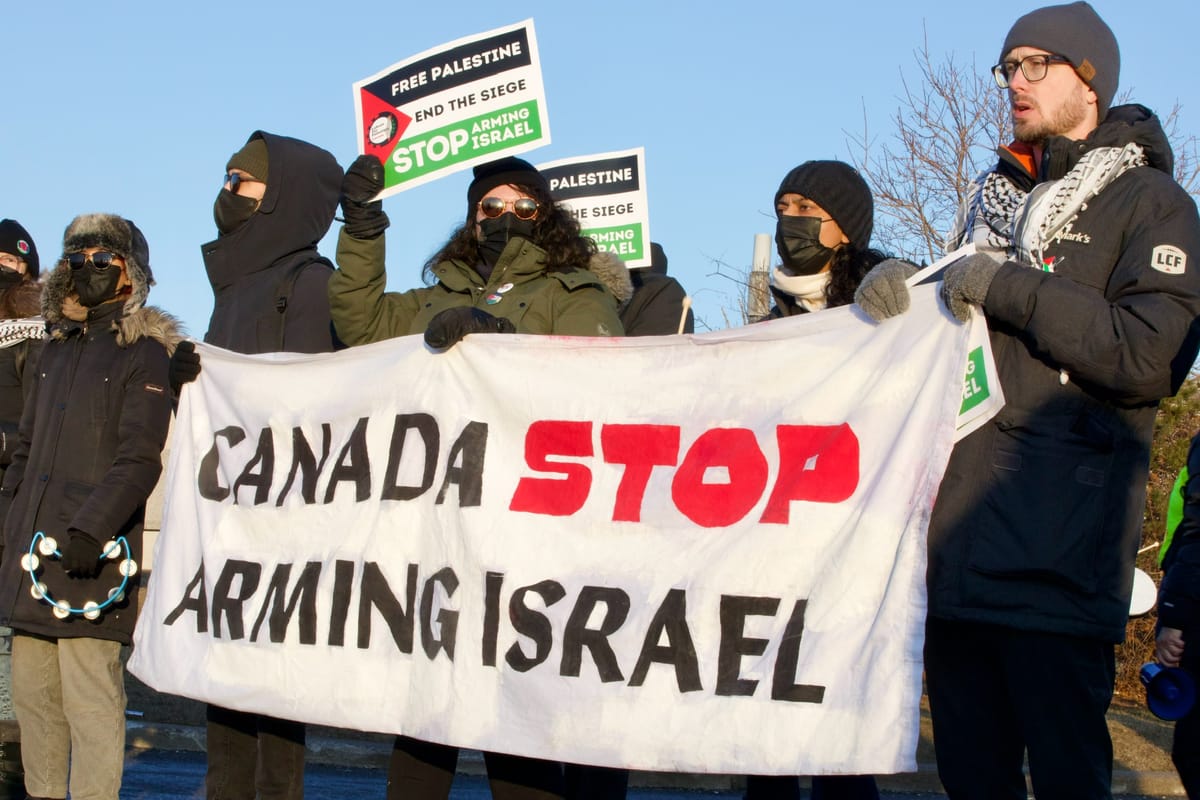
“Every action, be it a march, be it a weapons blockade, be it a picket, has included the active participation, and often leadership, of workers,” Small explained.
A few days after Israel began its attack on Gaza, Palestinian trade unions issued a statement calling on unionized workers in relevant industries to block the manufacturing and transfer of all military goods to Israel.
Simon Black, a professor of labour studies at Brock University and an organizer with Labour Against Arms Trade (LAAT), told The Maple that work between anti-war groups and labour unions has been underway for several years, with LAAT campaigning for the Canadian Labour Congress (CLC) to take a stand against the sale of Canadian light-armoured vehicles to Saudi Arabia.
“When it came to [the Arms Embargo Now campaign], we reached out to those unions, and we received a very positive response from them,” said Black. The next challenge, he said, will be encouraging some of Canada’s major private-sector unions to come aboard the campaign as well.
Black said he was heartened to see Unifor, Canada’s largest private-sector union, make a statement in defence of student protest encampments, which have faced brutal crackdowns by police and threats of attacks by pro-Israel counter-protesters.
“I think what we would want to see from a union like Unifor is to start doing the work necessary internally in terms of educating its membership — including its membership in the defence and military technology sectors — laying the groundwork so they can lend their principled voice to a campaign such as this,” said Black.
Black noted that last December, the United Auto Workers union committed to forming a Divestment and Just Transition working group to “study the history of Israel and Palestine, the union’s economic ties to the conflict, and to explore how to achieve a just transition for U.S. workers from war to peace.”
“We would expect no less from a principled union such as Unifor,” said Black.
“One of the challenges for private-sector unions, and particularly unions who represent workers in aerospace, defence, military goods and technology sectors, is the question of jobs,” he noted. For that reason, the Arms Embargo Now statement calls for the government to lead a “just transition” for any workers who might be impacted by any such embargo.
“We urge the government to work with trade unions representing these workers to develop short and long-term plans for a just transition that will secure their livelihoods and enable them to work without the fear of being complicit with Israel’s war crimes and possible genocide in Gaza,” the statement reads.
Black said that at every protest that has taken place outside of Canadian arms manufacturing facilities, organizers have designated liaisons to speak with employees arriving to work at the facility in order to explain why their workplace is being targeted.
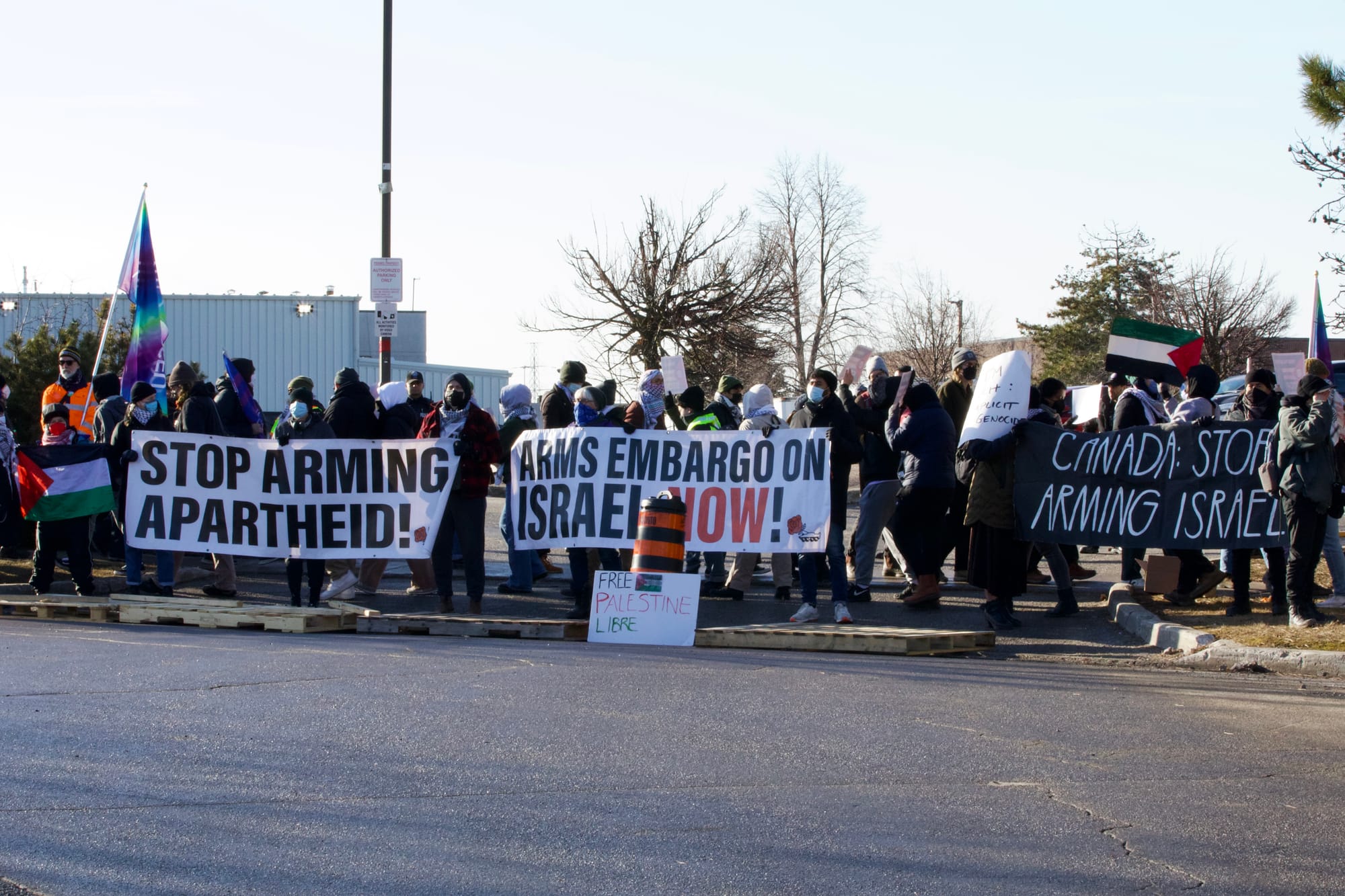
“The responses from those workers have been overwhelmingly positive,” Black explained. “Workers in general, if you give them the choice of the same wages, [and] if it’s unionized, the same protection of the union, the same benefits, and you have a choice of manufacturing the kind of technologies we need to deal with and manage the climate crisis, or building weapons destined for Israel and to be deployed in the genocidal violence against Palestinians in Gaza, there’s very few workers when you have those conversations who will say ‘yes, I actually prefer to be manufacturing weapons.’”
“But the fact is, under capitalism, workers don’t have that choice,” Black added. “And so that’s a choice that we have to continue to fight for.”
Alex Cosh is the news editor of The Maple.


